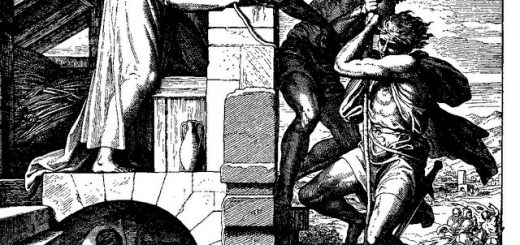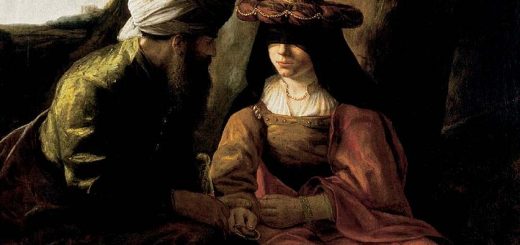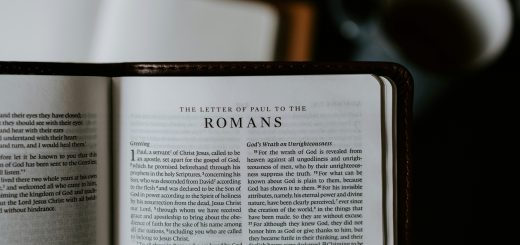Fasting for Jesus
Shared at Friday Prayer Meeting, 19 December 2014, by Ng Zhiwen
Then the disciples of John came to him, saying, “Why do we and the Pharisees fast, but your disciples do not fast?” And Jesus said to them, “Can the wedding guests mourn as long as the bridegroom is with them? The days will come when the bridegroom is taken away from them, and then they will fast. No one puts a piece of unshrunk cloth on an old garment, for the patch tears away from the garment, and a worse tear is made. Neither is new wine put into old wineskins. If it is, the skins burst and the wine is spilled and the skins are destroyed. But new wine is put into fresh wineskins, and so both are preserved.” (Matthew 9:14-17 ESV; see also Mark 2:18-22 and Luke 5:33-39)
We are in the Advent Season — it is Christmas time! Time to tuck into turkey and other good stuff that makes a feast. And the feasting must take place in a home, with family. Yet we have chosen, for our sermon series, to talk about “Longing for Home”, as if we are not home yet. In the Matthew passage, Jesus talks not about feasting, but fasting. In fact, he expects his disciples to fast. So are we talking about things here that do not fit the season?
Let me begin by noting that when we embarked on the theme of “Longing for Home”, we are saying that we (I mean the Church) are now living in the time between the first and the second comings (or Advents) of our Lord Jesus Christ. Before the first Advent, God’s people, the Jews, would fast for at least two reasons. First, they would fast on the Day of Atonement. That fast was to express sorrow for sin, and their need for atonement (Leviticus 16:31). It happened once a year.
But the second kind of fast could take place several times annually; these fasts were to express longing for the Messiah, for they were living under the domination of foreign power. The Jews fasted on days that commemorated tragic moments in Israel’s history (similar to the day Singapore fell to the Japanese in WWII). Such fasting expressed yearning for the restoration of Israel, the kingdom of God. And so, when the Jews asked Jesus why His disciples did not fast, they were probably thinking of this second kind of fast: “Jesus, why aren’t your followers longing for the kingdom of God? Where is your piety? Where is your national loyalty?”
But Jesus asks, why long for the kingdom of God, when the kingdom of God has come! It’s right here! Jesus uses the analogy of a wedding. Nobody would think of fasting when we are at a wedding. Fasting expresses mourning, and you shouldn’t look sad when the occasion calls for lively celebration! Well, here comes Jesus, full of life, pouring it out wherever He goes! In Luke 4:18-19, He says, “The Spirit of the Lord is upon me, because he has anointed me to proclaim good news to the poor. He has sent me to proclaim liberty to the captives and recovering of sight to the blind, to set at liberty those who are oppressed, to proclaim the year of the Lord’s favour.” This is the new life of the kingdom of God, when the bridegroom is in their midst.
When Messiah has come, of course it is not time to fast! We should celebrate with joy! The new wine has come, so you shouldn’t do the “old wineskin” fasting. The appropriate thing to do is to feast. And that, I think, is why Jesus and His disciples feasted, and why Christmas ought to be marked by feasting and festivity.
But then, Jesus also says that the time will come when the bridegroom will be taken away, and then the wedding guests will fast. Jesus expects His disciples to fast in that kind of situation. True enough, we read in Acts that the disciples did fast after Jesus ascended. We also have historical documents indicating that the early Christians would fast, twice a week!
It is also the situation that you and I find ourselves in — between the first and the second Advents. It is not difficult to see how the situation calls for fasting. The recent Sydney café hijacking, the massacre of young children and teachers in a school in Pakistan, the ongoing war in Syria and Iraq; not to mention other calamities that inflict great suffering but just aren’t dramatic enough to make the headlines. I also remember, how 10 years ago, on Boxing Day, a massive tsunami came and swept away the lives of hundreds of thousands, and it also swept away all the seasonal joy. In many countries, untold numbers of Christians suffer for the sake of their allegiance to Christ. All these are signs that things are not okay in this world, that we are still plagued with death, and with hostility against God’s kingdom.
And so we fast with longing for Jesus to come again. We fast when we are deeply, painfully aware of Jesus’ absence and that the world is not all that it should be. I quote John Piper: “Half of Christian fasting is that our physical appetite is lost because our homesickness for God is so intense. The other half is that our homesickness for God is threatened because our physical appetites are so intense.”
But I must add that our fast shall also be of the sort that matches the “new wine”: a “new wineskin” kind of fast. It’s not a copy of what the Jews did; it cannot be, because you and I have already tasted the wonderful joy of knowing Jesus. You and I as the church have experienced the joy of our sins forgiven, and a new life received, because Jesus has died and rose again! You and I have already tasted the fruits of that new life because God has given us His Holy Spirit.
And so we fast, with hope. We have had the appetiser, and are hungering (and groaning) for the main course and the dessert! We have the joy of the engagement, and are now yearning for the actual wedding day, to meet with our Bridegroom at the marriage supper of the Lamb — at the second Advent.
When we fast like that, we pray, “Jesus! We long for you! Come quickly! We miss you.”
When we think of how Christ came on Christmas, let us feast and pray.
When we think of His coming again, let us fast and pray.
“Surely I am coming soon.”
Amen. Come, Lord Jesus!
The grace of the Lord Jesus be with all. Amen.
Revelation 22:20-21










